We may not have the course you’re looking for. If you enquire or give us a call on 01344203999 and speak to our training experts, we may still be able to help with your training requirements.
Training Outcomes Within Your Budget!
We ensure quality, budget-alignment, and timely delivery by our expert instructors.
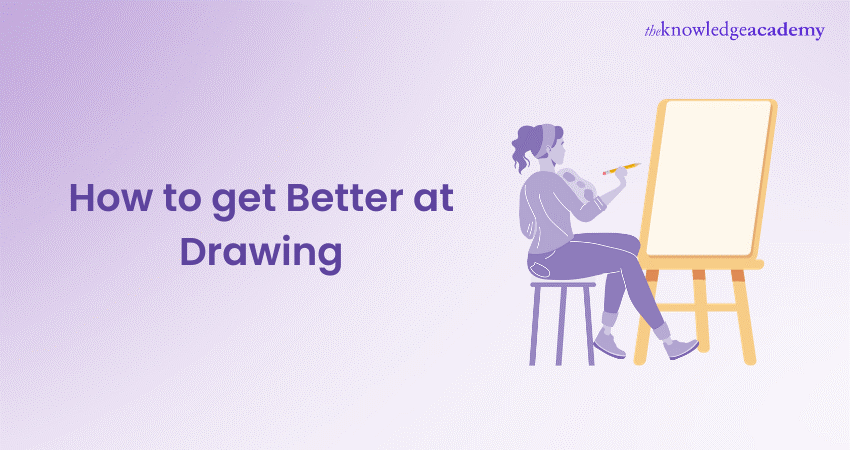
Embarking on the path of artistic growth is an exciting endeavour, especially when armed with the knowledge of How to Get Better at Drawing. Whether you're a novice seeking to refine fundamental skills or an experienced artist aiming for elevated mastery, this guide explores the intricacies of honing your craft.
From foundational principles to advanced techniques, learn the secrets to artistic improvement, unlocking your potential to create captivating and expressive drawings. Improving your drawing skills takes practice, patience, and a willingness to learn. Here are some tips to help you Get Better at Drawing.
Table of Contents
1) Tips to improve Drawing skills
a) Engage in a daily Drawing challenge
b) Revisit the fundamentals by focusing on basic shapes
c) Dedicate time to seek inspiration for your artwork
d) Create repeating patterns
e) Organise and periodically review your art collection
f) Enhance your skills in Drawing shadows, shapes, and perspective
g) Learn how to draw the world around you
h) fill a sketchbook with freehand doodles
I) Draw ordinary things
j) Draw circles
k) Draw repeating patterns
l) Draw organic shapes
2) Conclusion
Tips to improve Drawing skills
Elevating your Drawing skills requires dedication and a strategic approach. Understand the basics, build a diverse visual library, and practice consistently. Embrace mistakes as opportunities for growth, explore different styles, and seek inspiration. With patience and continuous effort, you'll not only improve your technical proficiency but also unlock the true expressive potential of your artistic voice.
Here is a list describing the many tips and recommendations for you to get better at Drawing:
a) Engage in a daily Drawing challenge
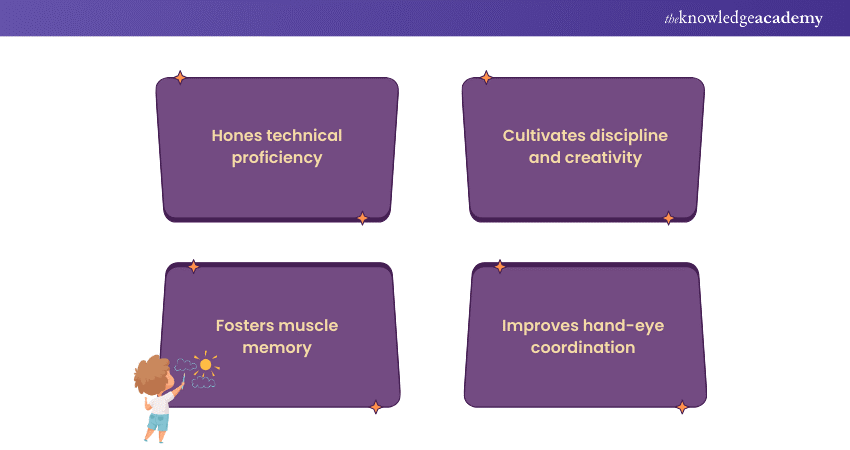
Embarking on a daily Drawing challenge is a transformative commitment that can exponentially enhance your artistic skills. This consistent practice not only hones your technical proficiency but also cultivates discipline and creativity.
Further, remember to set a realistic time frame, whether it's 15 minutes or an hour, and choose subjects that inspire you or push your boundaries. This routine not only fosters muscle memory but also stimulates your imagination, encouraging you to experiment with different styles and subjects.
Moreover, the daily Drawing challenge serves as a self-imposed deadline, sharpening your ability to think on your feet and make creative decisions efficiently. Over time, you'll witness a remarkable evolution in your skills, from improved hand-eye coordination to a heightened understanding of form and composition.
Additionally, sharing your daily creations online or with a supportive community provides valuable feedback and accountability. This collective experience not only fuels motivation but also creates a vibrant space for learning and inspiration. In essence, a daily Drawing challenge is a dynamic and enjoyable way to unlock your full artistic potential while establishing a rewarding and sustainable artistic habit.
b) Revisit the fundamentals by focusing on basic shapes
Returning to the fundamentals of Drawing by focusing on basic shapes is a powerful strategy to refine your artistic prowess. Whether you're a seasoned artist or just starting, understanding how to deconstruct complex forms into simple geometric shapes is a cornerstone of artistic proficiency.
Circles, squares, and triangles are elemental forms that serve as the building blocks for more intricate subjects. By revisiting this foundational practice, you train your eye to recognise the underlying structure in any object. This approach not only enhances your observational skills but also streamlines the process of translating what you see onto paper.
The emphasis on basic shapes serves as a grounding exercise, reinforcing proportion and symmetry. It's a methodical way to approach any subject, ensuring accuracy and capturing the essence of what you're Drawing.
This practice is not merely for beginners; even experienced artists benefit from periodic returns to these fundamentals as a means of refining technique and maintaining a solid artistic foundation. Embrace the simplicity of shapes, and you'll discover a profound impact on the depth and precision of your artistic expression.
c) Dedicate time to seek inspiration for your artwork
Dedicating time to seek inspiration for your artwork is an investment that pays creative dividends. Immersing yourself in diverse sources, from nature to literature, fuels your imagination and broadens your artistic horizons.
Visit galleries, explore online art communities, and absorb the work of both contemporary and historical masters. Embrace different cultures, study various art movements, and allow these influences to permeate your creative reservoir.
This intentional pursuit of inspiration is not just about finding ideas but cultivating a mindset of curiosity and receptivity. Take walks, attend cultural events, or simply observe the world around you with a keen eye.
Now, this dedicated exploration will infuse your artwork with depth and nuance, making your creative process richer and more meaningful. Remember, inspiration can be found anywhere, and the act of seeking it becomes a continual journey of discovery.
As you invest time in this creative nourishment, you'll find your artistic voice evolving and your work reflecting a tapestry of influences that make it uniquely yours.

d) Create repeating patterns
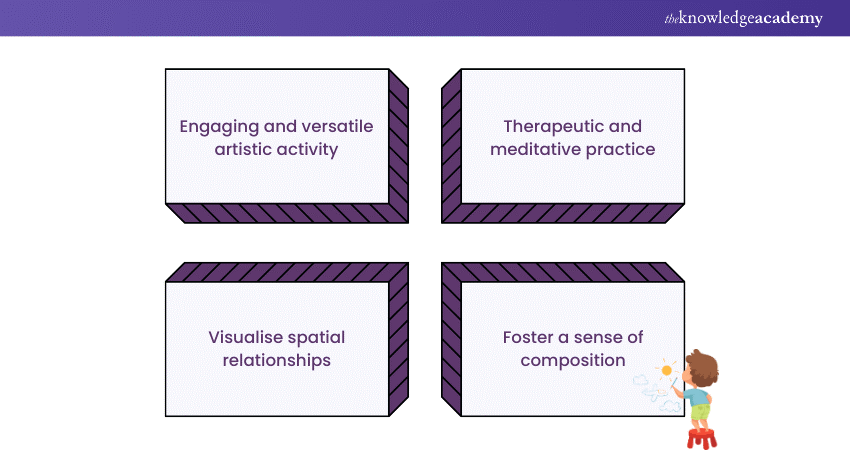
Creating repeating patterns is an engaging and versatile artistic endeavour that transcends various mediums, from traditional paper and pencil to digital platforms. This rhythmic arrangement of elements not only captivates the eye but also serves as a therapeutic and meditative practice for artists. It encourages meticulous attention to detail and precision, refining your fine motor skills.
Experiment with diverse motifs, shapes, and colours, exploring the endless combinations they can form. The process of designing repeating patterns hones your ability to visualise spatial relationships, fostering a keen sense of composition. It's an art form that seamlessly integrates into textiles, wallpaper, or digital backgrounds, adding a touch of aesthetic harmony to various surfaces.
Beyond its aesthetic appeal, creating repeating patterns sparks creativity and allows for a harmonious flow between structure and spontaneity. This rhythmic repetition not only produces visually pleasing results but also offers a captivating exploration of symmetry and balance.
Whether you're a seasoned artist or a beginner, diving into the world of repeating patterns unlocks a delightful avenue of artistic expression that simultaneously soothes and stimulates the creative mind.
e) Organise and periodically review your art collection
Organising and periodically reviewing your art collection is a strategic practice that goes beyond mere curation. It's a reflection of your artistic journey and growth. Begin by categorising your pieces, whether by medium, theme, or chronology, creating a coherent narrative within your collection. This deliberate organisation not only streamlines the viewing experience but also provides insight into the evolution of your artistic style.
Periodic reviews offer a unique opportunity for introspection and self-assessment. Analyse your body of work, identifying recurring themes, evolving techniques, and the emotional resonance of each piece. This reflective process not only informs your artistic trajectory but also helps you recognise patterns in your creative expression.
Moreover, revisiting your collection sparks inspiration and rejuvenates your artistic spirit. Witnessing the progression of your skills and the diversity of your creations fosters a sense of accomplishment. It's a reminder of your artistic journey's milestones and a source of motivation for future endeavours. By organising and periodically reviewing your art collection, you transform it into a dynamic reflection of your artistic identity, providing valuable insights and inspiration for your ongoing creative pursuits.
Leverage your software solutions by signing up for our Design Patterns Training now!
f) Enhance your skills in Drawing shadows, shapes, and perspective
Enhancing your skills in Drawing shadows, shapes, and perspective is a transformative journey that elevates the depth and realism of your artwork. Begin with mastering the interplay of light and shadow, understanding how it shapes and defines objects. Experiment with various shading techniques to convey form and create a three-dimensional illusion.
Next, delve into refining your grasp of shapes. Beyond basic forms, explore complex shapes within your subjects, breaking them down into manageable components. This meticulous analysis strengthens your observational skills and enhances your ability to recreate intricate details accurately.
Perspective is the third dimension that brings life to your Drawings. Understand the principles of linear perspective, vanishing points, and foreshortening to create realistic depth. Experiment with different viewpoints and focal lengths, mastering the art of guiding the viewer's eye through your composition.
By honing these fundamental skills, you not only add a level of sophistication to your Drawings but also gain a comprehensive understanding of how light, form and perspective work together. This proficiency not only enriches your artistic vocabulary but also empowers you to convey your visual ideas with precision and impact.
g) Learn how to draw the world around you
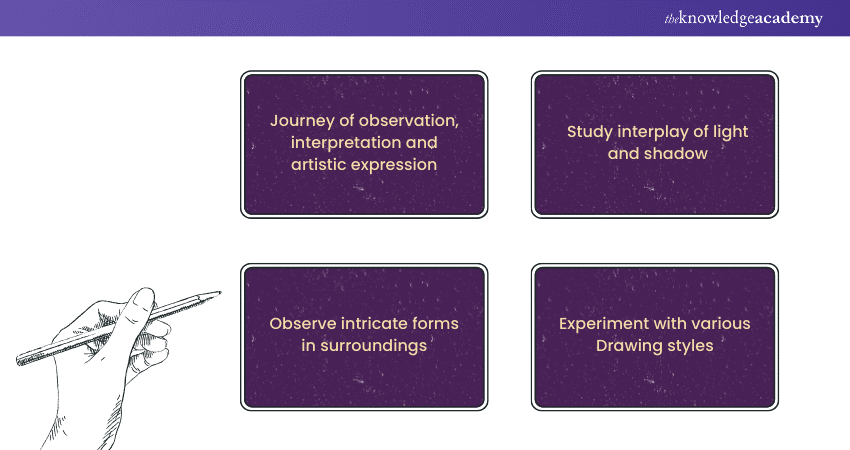
Learning how to draw the world around you is an immersive journey into observation, interpretation, and artistic expression. Start by honing your observational skills by paying attention to details, studying the interplay of light and shadow, and observing the intricate forms that define your surroundings.
Capture scenes from everyday life, whether it's a bustling cityscape, a serene landscape, or the intimacy of objects in your immediate environment. Translate what you see onto paper, refining your ability to depict the world with accuracy and emotion.
Experiment with different Drawing techniques and styles, discovering what resonates most with your artistic voice. Embrace the imperfections and nuances as they add authenticity to your creations.
This practice not only sharpens your technical skills but also deepens your connection to the world. It transforms mundane moments into artistic opportunities and fosters a profound appreciation for the beauty inherent in everyday life.
Learning to draw the world around you is not just a skill; it's a transformative mindset that enriches your perception, creativity, and ability to communicate through the universal language of art.
h) Fill a sketchbook with freehand doodles
Filling a sketchbook with freehand doodles is a liberating and imaginative exercise that transcends traditional artistic boundaries. This uninhibited approach to Drawing allows your creativity to flow organically, unrestricted by rules or expectations.
Doodling encourages a playful exploration of shapes, patterns, and ideas, fostering a direct connection between your mind and the paper. A sketchbook filled with freehand doodles becomes a visual diary of your spontaneous thoughts and inspirations. It's a space where experimentation thrives and artistic inhibitions dissolve.
The rhythmic, repetitive nature of doodling not only promotes relaxation but also hones fine motor skills and stimulates cognitive functions. This practice is not about perfection; rather, it's a celebration of the artistic process in its purest form. Embrace the unpredictability, let your imagination guide your hand, and witness the unique visual language that emerges.
Whether intricate patterns, whimsical characters, or abstract designs, each doodle tells a story, capturing the essence of your creative spirit within the pages of your sketchbook. It's a personal journey of self-expression and a testament to the boundless possibilities that unfold when creativity takes centre stage.
I) Draw ordinary things
Drawing ordinary things unveils the extraordinary beauty in the mundane, transforming commonplace objects into captivating works of art. Challenge yourself to find the allure in everyday items—the curve of a teacup, the texture of the fabric, or the play of light on a simple fruit. By focusing on the ordinary, you refine your ability to observe details and appreciate the subtle intricacies that often go unnoticed.
Capturing the essence of everyday life through Drawing is a celebration of the ordinary's inherent charm. It encourages a mindful exploration of your surroundings, elevating the significance of seemingly trivial subjects.
Embrace the challenge of infusing personality into commonplace objects, allowing your artistic interpretation to breathe life into the familiar. Moreover, Drawing ordinary things fosters a unique artistic perspective. It's an invitation to see the world with fresh eyes, finding inspiration in the simplicity that surrounds you.
The practice not only enhances your technical skills but also enriches your artistic voice, enabling you to communicate the beauty found in the ordinary, making it extraordinary on the canvas of your creativity.
Get started with characters and storylines by signing up for our Articulate Storyline Training Masterclass now!
j) Draw circles
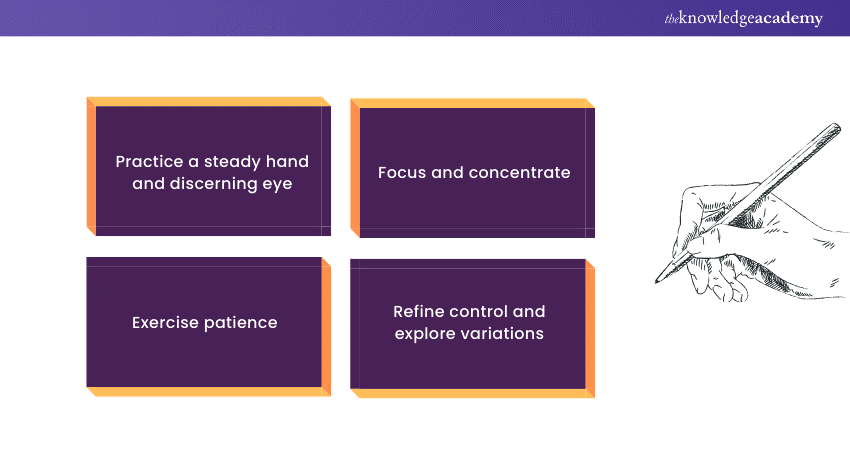
Drawing circles may seem simplistic, but it's a fundamental exercise with profound implications for your artistic skill set. Mastering the perfect circle requires precise control, enhancing fine motor skills and hand-eye coordination. This seemingly basic practice builds the foundation for more complex forms, fostering a steady hand and a discerning eye for proportion.
Beyond the technical benefits, Drawing circles is a meditative and therapeutic process. The rhythmic motion of creating circles promotes focus and concentration, providing a mindful escape into the creative zone. It's an exercise in patience, allowing you to refine your control over the Drawing tool and explore variations in size and symmetry.
Moreover, Drawing circles serve as a versatile starting point for countless artistic endeavours. Whether crafting mandalas, depicting planetary bodies, or forming the basis for intricate designs, the circle becomes a versatile building block in your artistic repertoire. Embrace the simplicity of Drawing circles, recognising it not just as a foundational skill but as a gateway to a world of creative possibilities limited only by your imagination.
k) Draw repeating patterns
Drawing repeating patterns is a captivating artistic pursuit that merges precision with creativity, unleashing a rhythmic visual symphony on paper. This practice involves meticulous planning and execution, enhancing your attention to detail and fine motor skills.
As you experiment with variations, your spatial awareness and sense of composition are refined, adding depth to your creative repertoire. Repeating patterns serve as a universal language across cultures and art forms, offering a timeless aesthetic appeal.
Whether inspired by nature, geometry, or personal motifs, these patterns become a reflection of your artistic voice. Engaging in this process provides a meditative experience, fostering a mindful connection between your ideas and the rhythmic flow of your creations.
From traditional pen-and-ink to digital platforms, Drawing repeating patterns encourages adaptability and exploration of various mediums. This practice not only enriches your artistic skills but also provides a unique outlet for self-expression.
Embrace the mesmerizing world of repeating patterns, where each stroke contributes to a harmonious visual tapestry, demonstrating the beauty that arises when precision and creativity intertwine on the canvas of your artistic imagination.
l) Draw organic shapes
Drawing organic shapes is a captivating exploration that celebrates the fluidity and unpredictability found in nature. This artistic practice transcends geometric precision, inviting you to embrace the irregularities and curves inherent in living forms. Capturing the essence of organic shapes refines your observational skills as you delve into the intricacies of leaves, petals, or natural contours.
This approach encourages a more intuitive and expressive artistic style. It challenges traditional notions of symmetry and order, allowing you to infuse your creations with a dynamic, spontaneous energy.
The process of Drawing organic shapes is a dance between the deliberate and the unexpected, fostering creative adaptability and improvisation. Beyond technical benefits, this practice connects you with the natural world, instilling a profound appreciation for its diversity.
Whether rendering the sinuous lines of vines or the irregular beauty of seashells, Drawing organic shapes is an immersive journey into the complexities and harmonies of life. Embrace the challenge of translating the inherently asymmetrical and vibrant aspects of nature onto paper, creating art that mirrors the organic rhythms of the world around you.
Conclusion
In conclusion, mastering the art of Drawing is a dynamic journey enriched by diverse practices that range from focusing on basic shapes to capturing the beauty of organic forms. The key to unlocking your artistic potential lies in consistent practice, exploring various styles, and embracing the myriad techniques outlined in this blog on How to Get Better at Drawing.
Learn to draw various characters and scenes by signing up for our Drawing Masterclass now!
Frequently Asked Questions
Upcoming Office Applications Resources Batches & Dates
Date
 Drawing Course
Drawing Course
Fri 17th Jan 2025
Fri 21st Mar 2025
Fri 16th May 2025
Fri 18th Jul 2025
Fri 19th Sep 2025
Fri 21st Nov 2025







 Top Rated Course
Top Rated Course


 If you wish to make any changes to your course, please
If you wish to make any changes to your course, please


